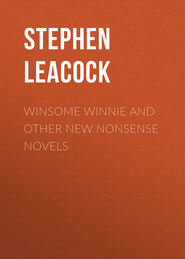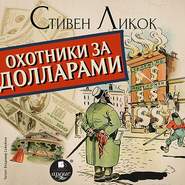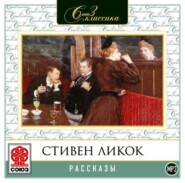По всем вопросам обращайтесь на: info@litportal.ru
(©) 2003-2025.
✖
The Hohenzollerns in America
Автор
Год написания книги
2019
Настройки чтения
Размер шрифта
Высота строк
Поля
My friend invited me to "come along." We would, he said, "blow in" upon the place and have a look at it.
It was in the fullness of the spring time that we went, when the leaves are out on the college campus, and when Commencement draws near, and when all the college, even the students, are busy.
Mr. Sims, I noted when I joined him at the train, was dressed as for the occasion. He wore a round straw hat with a coloured ribbon, and light grey suit, and a necktie with the garish colours of the college itself. Thus dressed, he leaned as lightly as his foot allowed him upon a yellow stick, and dreamed himself again an undergraduate.
I had thought the purpose of his visit a mere curiosity bred in his disappointment. It appeared that I was wrong. On the train Mr. Sims unfolded to me that his idea in "blowing in" upon his college was one of benefaction. He had it in his mind, he said, to do something for the "old place," no less a thing than to endow a chair. He explained to me, modestly as was his wont, the origin of his idea. The brewing business, it appeared, was rapidly reaching a stage when it would have to be wound up. The movement of prohibition would necessitate, said Mr. Sims, the closing of the plant. The prospect, in the financial sense, occasioned my friend but little excitement. I was given to understand that prohibition, in the case of Mr. Sims's brewery, had long since been "written off" or "written up" or at least written somewhere where it didn't matter. And the movement itself Mr. Sims does not regard as permanent. Prohibition, he says, is bound to be washed out by a "turn of the tide"; in fact, he speaks of this returning wave of moral regeneration much as Martin Luther might have spoken of the Protestant Reformation. But for the time being the brewery will close. Mr. Sims had thought deeply, it seemed, about putting his surplus funds into the manufacture of commercial alcohol, itself a noble profession. For some time his mind has wavered between that and endowing a chair of philosophy. There is, and always has been, a sort of natural connection between the drinking of beer and deep quiet thought. Mr. Sims, as a brewer, felt that philosophy was the proper thing.
We left the train, walked through the little town and entered the university gates.
"Gee!" said Mr. Sims, pausing a moment and leaning on his stick, "were the gates only as big as that?"
We began to walk up the avenue.
"I thought there were more trees to it than these," said
Mr. Sims.
"Yes," I answered. "You often said that the avenue was a quarter of a mile long."
"So the thing used to be," he murmured.
Then Mr. Sims looked at the campus. "A dinky looking little spot," he said.
"Didn't you say," I asked, "that the Arts Building was built of white marble?"
"Always thought it was," he answered. "Looks like rough cast from here, doesn't it."
"We'll have to go in and see the President, I suppose," continued Mr. Sims. He said it with regret. Something of his undergraduate soul had returned to his body. Although he had never seen the President (this one) in his life, and had only read of his appointment some five years before in the newspapers, Mr. Sims was afraid of him.
"Now, I tell you," he went on. "We'll just make a break in and then a quick get-away. Don't let's get anchored in there, see? If the old fellow gets talking, he'll go on for ever. I remember the way it used to be when a fellow had to go in to see Prexy in my time. The old guy would start mooning away and quoting Latin and keep us there half the morning."
At this moment two shabby-looking, insignificant men who had evidently come out from one of the buildings, passed us on the sidewalk.
"I wonder who those guys are," said Mr. Sims. "Look like bums, don't they?"
I shook my head. Some instinct told me that they were professors. But I didn't say so.
My friend continued his instructions.
"When the President asks us to lunch," he said, "I'll say that we're lunching with a friend down town, see? Then we'll make a break and get out. If he says he wants to introduce us to the Faculty or anything like that, then you say that we have to get the twelve-thirty to New York, see? I'm not going to say anything about a chair in philosophy to-day. I want to read it up first some night so as to be able to talk about it."
To all of this I agreed.
From a janitor we inquired where to find the President.
"In the Administration Building, eh?" said Mr. Sims.
"That's a new one on me. The building on the right, eh?
Thank you."
"See the President?" said a young lady in an ante-office. "I'm not sure whether you can see him just now. Have you an appointment?"
Mr. Sims drew out a card. "Give him that" he said. On the card he had scribbled "Graduate of 1887."
In a few minutes we were shown into another room where there was a young man, evidently the President's secretary, and a number of people waiting.
"Will you kindly sit down," murmured the young man, in a consulting-room voice, "and wait? The President is engaged just now."
We waited. Through the inner door leading to the President people went and came. Mr. Sims, speaking in whispers, continued to caution me on the quickness of our get-away.
Presently the young man touched him on the shoulder.
"The President will see you now," he whispered.
We entered the room. The "old guy" rose to meet us, Mr. Sims's card in his hand. But he was not old. He was at least ten years younger than either of us. He was, in fact, what Mr. Sims and I would almost have called a boy. In dress and manner he looked as spruce and busy as the sales manager of a shoe factory.
"Delighted to see you, gentlemen," he said, shaking hands effusively. "We are always pleased to see our old graduates, Mr. Samson—No, I beg pardon, Mr. Sims—class of '97, I see—No, I beg your pardon, Class of '67, I read it wrongly—"
I heard Mr. Sims murmuring something that seemed to contain the words "a look around."
"Yes, yes, exactly," said the President. "A look round, you'll find a great deal to interest you in looking about the place, I'm sure, Mr. Samson, great changes. I'm extremely sorry I can't offer to take you round myself," here he snapped a gold watch open and shut, "the truth is I have to catch the twelve-thirty to New York—so sorry."
Then he shook our hands again, very warmly.
In another moment we were outside the door. The get-away was accomplished.
We walked out of the building and towards the avenue.
As we passed the portals of the Arts Building, a noisy, rackety crowd of boys—evidently, to our eyes, schoolboys —came out, jostling and shouting. They swarmed past us, accidentally, no doubt, body-checking Mr. Sims, whose straw hat was knocked off and rolled on the sidewalk. A janitor picked it up for him as the crowd of boys passed.
"What pack of young bums are those?" asked Mr. Sims. "You oughtn't to let young roughs like that come into the buildings. Are they here from some school or something?"
"No sir," said the janitor. "They're students."
"Students?" repeated Mr. Sims. "And what are they shouting like that for?"
"There's a notice up that their professor is ill, and so the class is cancelled, sir."
"Class!" said Mr. Sims. "Are those a class?"
"Yes, sir," said the janitor. "That's the Senior Class in Philosophy."
Mr. Sims said nothing. He seemed to limp more than his custom as we passed down the avenue.
On the way home on the train he talked much of crude alcohol and the possibilities of its commercial manufacture.
So far as I know, his only benefaction up to date has been the two dollars that he gave to a hackman to drive us away from the college.
It was in the fullness of the spring time that we went, when the leaves are out on the college campus, and when Commencement draws near, and when all the college, even the students, are busy.
Mr. Sims, I noted when I joined him at the train, was dressed as for the occasion. He wore a round straw hat with a coloured ribbon, and light grey suit, and a necktie with the garish colours of the college itself. Thus dressed, he leaned as lightly as his foot allowed him upon a yellow stick, and dreamed himself again an undergraduate.
I had thought the purpose of his visit a mere curiosity bred in his disappointment. It appeared that I was wrong. On the train Mr. Sims unfolded to me that his idea in "blowing in" upon his college was one of benefaction. He had it in his mind, he said, to do something for the "old place," no less a thing than to endow a chair. He explained to me, modestly as was his wont, the origin of his idea. The brewing business, it appeared, was rapidly reaching a stage when it would have to be wound up. The movement of prohibition would necessitate, said Mr. Sims, the closing of the plant. The prospect, in the financial sense, occasioned my friend but little excitement. I was given to understand that prohibition, in the case of Mr. Sims's brewery, had long since been "written off" or "written up" or at least written somewhere where it didn't matter. And the movement itself Mr. Sims does not regard as permanent. Prohibition, he says, is bound to be washed out by a "turn of the tide"; in fact, he speaks of this returning wave of moral regeneration much as Martin Luther might have spoken of the Protestant Reformation. But for the time being the brewery will close. Mr. Sims had thought deeply, it seemed, about putting his surplus funds into the manufacture of commercial alcohol, itself a noble profession. For some time his mind has wavered between that and endowing a chair of philosophy. There is, and always has been, a sort of natural connection between the drinking of beer and deep quiet thought. Mr. Sims, as a brewer, felt that philosophy was the proper thing.
We left the train, walked through the little town and entered the university gates.
"Gee!" said Mr. Sims, pausing a moment and leaning on his stick, "were the gates only as big as that?"
We began to walk up the avenue.
"I thought there were more trees to it than these," said
Mr. Sims.
"Yes," I answered. "You often said that the avenue was a quarter of a mile long."
"So the thing used to be," he murmured.
Then Mr. Sims looked at the campus. "A dinky looking little spot," he said.
"Didn't you say," I asked, "that the Arts Building was built of white marble?"
"Always thought it was," he answered. "Looks like rough cast from here, doesn't it."
"We'll have to go in and see the President, I suppose," continued Mr. Sims. He said it with regret. Something of his undergraduate soul had returned to his body. Although he had never seen the President (this one) in his life, and had only read of his appointment some five years before in the newspapers, Mr. Sims was afraid of him.
"Now, I tell you," he went on. "We'll just make a break in and then a quick get-away. Don't let's get anchored in there, see? If the old fellow gets talking, he'll go on for ever. I remember the way it used to be when a fellow had to go in to see Prexy in my time. The old guy would start mooning away and quoting Latin and keep us there half the morning."
At this moment two shabby-looking, insignificant men who had evidently come out from one of the buildings, passed us on the sidewalk.
"I wonder who those guys are," said Mr. Sims. "Look like bums, don't they?"
I shook my head. Some instinct told me that they were professors. But I didn't say so.
My friend continued his instructions.
"When the President asks us to lunch," he said, "I'll say that we're lunching with a friend down town, see? Then we'll make a break and get out. If he says he wants to introduce us to the Faculty or anything like that, then you say that we have to get the twelve-thirty to New York, see? I'm not going to say anything about a chair in philosophy to-day. I want to read it up first some night so as to be able to talk about it."
To all of this I agreed.
From a janitor we inquired where to find the President.
"In the Administration Building, eh?" said Mr. Sims.
"That's a new one on me. The building on the right, eh?
Thank you."
"See the President?" said a young lady in an ante-office. "I'm not sure whether you can see him just now. Have you an appointment?"
Mr. Sims drew out a card. "Give him that" he said. On the card he had scribbled "Graduate of 1887."
In a few minutes we were shown into another room where there was a young man, evidently the President's secretary, and a number of people waiting.
"Will you kindly sit down," murmured the young man, in a consulting-room voice, "and wait? The President is engaged just now."
We waited. Through the inner door leading to the President people went and came. Mr. Sims, speaking in whispers, continued to caution me on the quickness of our get-away.
Presently the young man touched him on the shoulder.
"The President will see you now," he whispered.
We entered the room. The "old guy" rose to meet us, Mr. Sims's card in his hand. But he was not old. He was at least ten years younger than either of us. He was, in fact, what Mr. Sims and I would almost have called a boy. In dress and manner he looked as spruce and busy as the sales manager of a shoe factory.
"Delighted to see you, gentlemen," he said, shaking hands effusively. "We are always pleased to see our old graduates, Mr. Samson—No, I beg pardon, Mr. Sims—class of '97, I see—No, I beg your pardon, Class of '67, I read it wrongly—"
I heard Mr. Sims murmuring something that seemed to contain the words "a look around."
"Yes, yes, exactly," said the President. "A look round, you'll find a great deal to interest you in looking about the place, I'm sure, Mr. Samson, great changes. I'm extremely sorry I can't offer to take you round myself," here he snapped a gold watch open and shut, "the truth is I have to catch the twelve-thirty to New York—so sorry."
Then he shook our hands again, very warmly.
In another moment we were outside the door. The get-away was accomplished.
We walked out of the building and towards the avenue.
As we passed the portals of the Arts Building, a noisy, rackety crowd of boys—evidently, to our eyes, schoolboys —came out, jostling and shouting. They swarmed past us, accidentally, no doubt, body-checking Mr. Sims, whose straw hat was knocked off and rolled on the sidewalk. A janitor picked it up for him as the crowd of boys passed.
"What pack of young bums are those?" asked Mr. Sims. "You oughtn't to let young roughs like that come into the buildings. Are they here from some school or something?"
"No sir," said the janitor. "They're students."
"Students?" repeated Mr. Sims. "And what are they shouting like that for?"
"There's a notice up that their professor is ill, and so the class is cancelled, sir."
"Class!" said Mr. Sims. "Are those a class?"
"Yes, sir," said the janitor. "That's the Senior Class in Philosophy."
Mr. Sims said nothing. He seemed to limp more than his custom as we passed down the avenue.
On the way home on the train he talked much of crude alcohol and the possibilities of its commercial manufacture.
So far as I know, his only benefaction up to date has been the two dollars that he gave to a hackman to drive us away from the college.














